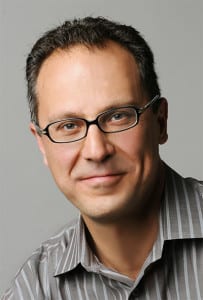
By Andrew Cohen
For new faculty member Sean Farhang, joining Berkeley Law made perfect sense. A professor in UC Berkeley’s public policy school and political science department, he relished the thought of reconnecting with his scholarly roots.
“In many ways, this is kind of like coming back home for me,” Farhang said of his recent cross-appointment to the law school. “I liked the idea of being around law students and lawyers and engaging with people who share my interest in litigation and how rights get implemented in courts.”
An NYU Law graduate, Farhang clerked for a federal district court judge in Pennsylvania before working for seven years as a law-firm litigation associate. Berkeley Law Dean Sujit Choudhry noted that “Sean simultaneously brings great practice experience in civil litigation and research accomplishments in political science that complement our existing strengths in civil procedure and public law.”
Farhang is no stranger to Berkeley Law, having served on several Ph.D. dissertation committees within the school’s Jurisprudence and Social Policy (JSP) Program. This fall, however, he has also immersed himself in the JD Program by teaching Civil Procedure to first-year students.
The course is an ideal fit for Farhang, who spent considerable time in court while specializing in employment discrimination and fair labor standards litigation.
“I’ve studied civil litigation as a political scientist and as a social scientist,” Farhang said. “It’s been fun to teach the core doctrines and home in on the substantive law side of Civ Pro as opposed to its more structural aspects. I love the law students here, and it’s been really rewarding to interact with them.”
Award-winning analysis
Farhang’s feel for court-system nuances was affirmed by the reaction to his first book, The Litigation State: Public Regulation and Private Lawsuits in the United States (Princeton University Press, 2010). It earned two top honors from the American Political Science Association—the Gladys M. Kammerer Award for best political science publication in the field of U.S. national policy, and the C. Herman Pritchett Award for best book on law and courts.
His second book, Rights and Retrenchment: The Counterrevolution Against Federal Litigation (co-authored with Stephen Burbank of Penn Law), will be published next year by Cambridge University Press. The book seeks to understand efforts by courts and Congress to rein in civil litigation following its massive growth in enforcing federal regulatory law in the 1960s and 70s.
Over time, Farhang—who received a Ph.D. in Political Science from Columbia while working as a lawyer—hopes to teach other courses related to civil litigation and deepen his relationship with the JSP Program.
“There’s a longstanding strength in what I study at JSP, specifically the relationship between litigation and other political institutions,” he said. “There are also some great scholars like Martin Shapiro and Robert Kagan who recently retired or went emeritus, and much of my work follows on landmark work they did.”
Farhang also wants to help develop more collaborative projects between Berkeley Law and the Goldman School of Public Policy, and has been talking to other law faculty about possibilities.
“I’d like to be a bridge person between the two schools,” he said. “There seem to be many opportunities for fruitful connections, and it’s clear that Dean Choudhry wants to build them.”